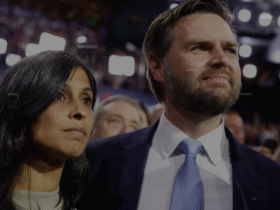Superman is topping the box office charts with over $220 million globally during its opening weekend, yet James Gunn stance on Israel has become the unexpected focus of heated debate. The superhero blockbuster, which cost Warner/Discovery $225 million to produce with another $125 million allocated for advertising, has sparked political discussions far beyond typical film criticism.
Created in 1938 by Jewish immigrants Jerry Siegel and Joe Shuster, Superman has long been one of the world’s most beloved superheroes. However, the James Gunn controversy has intensified as viewers debate whether the film’s fictional conflict between Bovaria and Jarhanpur intentionally mirrors the real-world Israel-Palestine situation. Despite James Gunn political views being scrutinized, the director has flatly denied that the film is a commentary on Israel or the Palestinians. Nevertheless, the film has provoked hashtags like “#SupermanIsHamas”, highlighting how James Gunn political controversies extend beyond creative choices to questions about Hollywood lobby influence in mainstream cinema.
This article examines the allegory in Superman, Gunn’s public statements, the film industry’s relationship with Israel, and how this cultural phenomenon reflects a potential generational shift in political perspectives.
Superman’s Political Allegory: Does It Reflect James Gunn Stance on Israel?
At the center of the Superman controversy stands the fictional conflict between Boravia and Jarhanpur. Initially presented as a straightforward superhero intervention, this narrative device has become the focal point of intense cultural debate about what audiences see reflected in mainstream entertainment.
How the fictional war mirrors real-world conflicts
The Boravian-Jarhanpurian War depicts a powerful nation invading a weaker neighbor. Boravia is clearly coded as an Eastern European country with Slavic-speaking leaders and Russian architecture, while simultaneously being portrayed as a cherished U.S. ally using American-made weaponry. In contrast, Jarhanpur appears as an impoverished nation with a primarily brown-skinned population. This stark power imbalance—a technologically advanced superpower attacking a politically unstable region—has prompted viewers to draw parallels with contemporary conflicts.
Visual and narrative cues that evoke Gaza
The visual language of the conflict contains striking elements that many find reminiscent of Gaza:
- Boravian tanks and troops smashing through a fence into crowds of Jarhanpurian civilians
- Children clutching national flags as civilians scatter in fear
- Jarhanpurians wielding “pitchforks and shovels” against a fully equipped military
Furthermore, the climactic battle has reminded some viewers specifically of the 2018-2019 Gaza border protests, when Palestinians demonstrated at the Israel-Gaza boundary. The imagery of Boravian soldiers in military gear confronting civilians also evokes scenes of IDF soldiers in Gaza.
Why do audiences see Israel-Palestine in the story?
Essentially, viewers bring their own context to the film. When Superman defends the weaker nation against a U.S.-backed aggressor claiming to “liberate” people from tyranny, the parallel becomes difficult to ignore for many. The film’s dialogue mirrors familiar arguments in the Israel-Palestine debate, with Lois Lane questioning whether Jarhanpurians “aren’t innocent” and raising concerns about future threats, rhetoric often employed regarding Hamas.
Despite James Gunn’s insistence that “when I wrote this, the Middle Eastern conflict wasn’t happening”, the allegory has taken hold. The film captures a dynamic many recognize: “a powerful, U.S.-backed aggressor invading a poor, largely defenseless neighbor”. This resonance explains why a superhero blockbuster has sparked such intense political discourse.
James Gunn’s Political Views and Public Statements
Since the release of Superman, director James Gunn has found himself at the center of political discourse beyond his filmmaking decisions. His public statements and political positions have become as scrutinized as the film’s box office performance.
Gunn’s denial of Middle East parallels
When confronted about perceived parallels between the fictional conflict and real-world events in the Middle East, Gunn has categorically rejected these interpretations. On social media, he stated firmly that any perceived allegory was unintentional, noting, “When I wrote this, the Middle Eastern conflict wasn’t happening.” He maintains that the storyline was created well before the current escalation in Gaza, thereby making intentional parallels impossible.
His comments on Superman as an immigrant
Notably, Gunn has emphasized Superman’s origins as an immigrant story. He frequently points to the character’s creators—Jewish immigrants Jerry Siegel and Joe Shuster—as foundational to understanding Superman’s identity. This framing presents Superman as a refugee seeking safety and acceptance, which some critics argue contradicts the perceived pro-Israel messaging they detect in the film.
Reactions from conservative media and pundits
Right-wing media outlets have seized on the controversy, with some commentators accusing Gunn of embedding “woke” politics into the superhero genre. Others have praised what they perceive as pro-Western values in the film. This polarized reception underscores how superhero narratives increasingly serve as proxies for political discourse in American culture.
James Gunn controversy: Is it intentional or a misread?
The question remains whether Gunn deliberately created political commentary or if audiences are projecting contemporary conflicts onto his storytelling. Given that production timelines for blockbusters span years, Gunn’s claim that the script predated current events has merit. Nevertheless, the timing of the release amid heightened tensions in Gaza has undoubtedly shaped audience interpretation, regardless of authorial intent.
Hollywood’s Relationship with Israel and Lobby Influence
The entertainment industry has long maintained a complex relationship with Middle Eastern politics. Mainstream Hollywood productions historically shy away from direct criticism of Israel, opting instead for allegorical storytelling when addressing such sensitive geopolitical issues.
Historical reluctance to criticize Israel in film
Major studios have traditionally avoided explicit critiques of Israeli policies, preferring to address Middle Eastern conflicts through metaphor or fictional stand-ins. This approach allows filmmakers to explore controversial themes while minimizing potential backlash from audiences and advocacy organizations.
James Gunn Hollywood Lobby Influence: Real or exaggerated?
The question of whether outside influences shaped Superman‘s narrative remains contentious. Though some critics suggest lobby pressure affects creative decisions, others maintain that such claims overstate external control over artistic choices. Gunn himself has consistently denied that his storytelling was influenced by political pressure.
The role of the ADL and other advocacy groups
Organizations like the Anti-Defamation League routinely engage with studios regarding portrayals of Jewish people and Israel. Their influence exists within a broader ecosystem of advocacy groups that monitor media representations of various communities and geopolitical situations.
How Warner Bros. backed the film despite risks
Throughout the controversy, Warner Bros. has stood behind Gunn’s creative vision, acknowledging that contemporary blockbusters inevitably intersect with real-world politics. This backing demonstrates the studio’s confidence in both the film’s commercial appeal and its ability to withstand political scrutiny.
Cultural Impact and Generational Shift
The generational divide in audience reactions to Superman reflects broader shifts in how superhero narratives are understood in contemporary culture.
Why do younger audiences interpret the film differently?
Younger viewers primarily see Superman through a socio-political lens rather than as mere entertainment. For today’s 20-somethings, Superman represents an immigrant story and a call for basic human kindness in an increasingly cynical world. This generation finds Superman most relatable when he struggles with moral questions rather than appearing as an untouchable paragon. Many Gen Z viewers connect with a Superman who feels uncertain yet continues to choose compassion.
Social media’s role in shaping the narrative
Social media has amplified and polarized interpretations of the film. Superman even incorporates this dynamic within its storyline – Lex Luthor employs “Rage Monkeys” to spread negative content about Superman online, turning public opinion against him. This subplot mirrors James Gunn’s own experiences with social media backlash. As one reviewer noted, the film serves as commentary on how “meanness is sort of the center of pop culture” and how toxic fandom manifests through digital platforms.
Superman’s evolving symbolism in modern politics
Currently, Superman functions as a cultural Rorschach test – what audiences see reflects their political perspectives. Conservative commentators labeled the film “Superwoke” following Gunn’s comments about Superman as an immigrant story. Conversely, progressive viewers celebrate its hopeful vision. This tension demonstrates how Superman has become more than entertainment – he’s a contested symbol in ongoing cultural debates about American identity, immigration, and moral leadership.
Final Thoughts
The Superman controversy illuminates broader questions about artistic intent versus audience interpretation. James Gunn stance on Israel remains a contested subject precisely because superhero narratives serve as cultural mirrors. Throughout this analysis, we’ve seen how the Boravia-Jarhanpur conflict functions as a canvas upon which viewers project contemporary geopolitical tensions.
What makes the James Gunn controversy particularly fascinating is its existence at the intersection of entertainment and politics. Even as Gunn maintains that no Israel-Palestine allegory was intended, the film demonstrates how superhero stories inevitably absorb and reflect the anxieties of their moment. In many ways, the director’s political views become secondary to how audiences process and interpret the material through their own ideological frameworks.
The James Gunn political controversies highlight a fundamental truth about contemporary media: authorial intent no longer dictates meaning in an era of participatory culture. As a result, the debate around possible James Gunn Hollywood lobby influence becomes less about proving external pressure and more about examining how political narratives shape creative expression.
Ultimately, the Superman debate represents neither a deliberate political statement nor a complete misreading. Instead, it reveals how superhero cinema functions as contested cultural territory where questions of power, intervention, and justice play out, both on screen and in public discourse.
FAQs
1. Does the new Superman movie support Palestine?
The film does not explicitly support Palestine. However, many viewers believe the fictional war between Boravia and Jarhanpur parallels real-world events in Gaza. Director James Gunn has denied any intentional allegory related to the Israel-Palestine conflict.
2. What is James Gunn stance on Israel?
James Gunn has not made any public statements specifically supporting or opposing Israeli policy. He has maintained that the Superman script was written before the recent Middle East escalation and has dismissed claims that the film carries a political message about Israel or Palestine.
3. Why are people comparing Superman to the Gaza conflict?
Visual and narrative elements in the film—such as a technologically advanced nation attacking a poorer region and scenes showing military forces confronting civilians—have led some audiences to interpret the story as a symbolic representation of the Israeli-Palestinian conflict.
4. What role does the Hollywood lobby play in shaping superhero films?
Some critics argue that Hollywood studios, influenced by organizations like the ADL or broader pro-Israel advocacy, avoid direct criticism of Israel and instead use allegory. However, there is no direct evidence that lobby groups influenced James Gunn’s Superman film.
5. Why is #SupermanIsHamas trending online?
The hashtag emerged from political debates following the film’s release. It reflects polarized interpretations of the movie, with some critics accusing it of sympathizing with pro-Palestinian narratives, while others see it as misreading the creative intent.
6. How has Warner Bros. responded to the controversy?
Warner Bros. has stood by James Gunn and the film’s artistic direction, emphasizing that superhero films often spark cultural debate but are not meant to serve as political endorsements.
7. What did James Gunn say about Superman’s immigrant identity?
Gunn has emphasized Superman as an immigrant figure, referencing the character’s Jewish creators and refugee backstory. This framing has further fueled discussions about the film’s deeper cultural symbolism.
8. Has the controversy impacted the film’s box office performance?
No. Despite the political debates, the Superman film earned over $220 million globally during its opening weekend, making it one of the most successful DC releases in recent years.
9. Is it common for superhero movies to reflect real-world politics?
Yes. Many superhero films have historically echoed real-world themes such as war, authoritarianism, immigration, and civil rights, though often through fictional allegory rather than direct commentary.
10. Could James Gunn’s film unintentionally mirror current geopolitical events?
It’s possible. Artistic works often resonate with real-world issues, even if unintentional. Audience interpretation, especially in politically charged times, can shape public perception beyond the creator’s original vision.







2 Comments